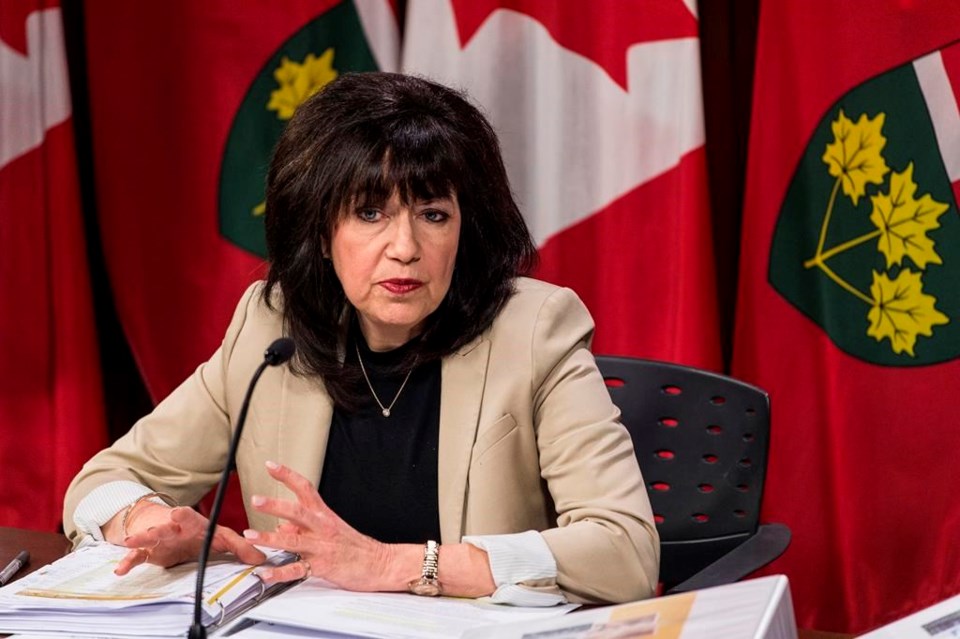TORONTO — Ontario's response to the COVID-19 pandemic was slower and more reactive than that of other provinces, hampered by "delays and confusion in decision-making" as public health experts took a secondary role to government officials and politicians, the province's auditor general said Wednesday.
Outdated provincial emergency plans played a role in slowing down the response in the winter and spring, as did systemic issues such as a lack of laboratory surge capacity and old IT systems, Bonnie Lysyk said in a report.
Lysyk also pointed to a cumbersome command structure, and one that was not led by public health expertise despite the creation and expansion of a provincial health command table that she says now involves more than 500 people.
As well, she found the province's chief medical officer of health did not fully exercise his powers in responding to the pandemic, or issue directives to local health officials to ensure a consistent approach across regions. A provincial message on masking for the general public didn't come until October, she noted as an example, and was then issued by the province, not Dr. David Williams.
"Despite COVID-19 being a public health pandemic, we noted that those with public health expertise did not play a leading role in the ministry's response," the report said.
"Local medical officers of health informed us that they were confused by provincial politicians delivering critical public health advice in place of the chief medical officer of health."
Asked whether Williams had lacked leadership, Lysyk said he "worked with the system that was there," one in which he had an advisory role.
The auditor general also raised concerns that lab testing, case management and contact tracing were not being conducted in a timely enough manner to limit the spread of the virus, noting that between January and August, all but one public health unit failed to meet the target of reporting test results within a day 60 per cent of the time.
The findings are part of a special report that examines Ontario's emergency management in the context of the pandemic, and its outbreak planning and decision-making, among other things.
The governing Progressive Conservatives took issue with many parts of the report, with Premier Doug Ford dismissing it as "21 pages of inaccuracies" while accusing Lysyk of overstepping her authority.
"The auditor general's job is not to be the chief medical officer, not to be the ombudsman, not to sit there and give us health advice," Ford said.
"Stick with looking for value for money, stick with the job that we hired you for."
The premier further suggested that co-operating with the audit process had siphoned government resources away from tackling the pandemic.
Health Minister Christine Elliott, meanwhile, said that while the government welcomes some of the points raised by the auditor, the report is a "disappointment" and "in many respects, a mischaracterization of the province's pandemic response."
"We have been decisive at every turn," she said, adding Ontario was the first province to designate COVID-19 as a publicly reportable infectious disease and the second to declare a health emergency due to the pandemic. Ontario also has the lowest active case rate of any province outside Atlantic Canada, at 89 per 100,000 people, she said.
Elliott took issue with the auditor's finding that Williams did not lead the provincial pandemic response. The government has always followed Williams' recommendations, though it may have discussed "some potential small changes" at various points, she said.
The government has faced repeated requests to publicly release Williams' advice to the minister and cabinet but has yet to do so, an issue the auditor's report noted. Ford said Wednesday he would consider taking that step but insisted his government has been transparent in its decision-making.
The government announced earlier this week it planned to extend Williams' term - which was set to end with his retirement in February - until September.
Lysyk said many of the issues her office identified would have been avoidable if the province had acted on lessons from the 2003 SARS outbreak.
Among the recommendations from the SARS Commission were reforms to streamline operations and management of the province's 34 public health units, which continue to function independently, often without sharing best practices, she said.
As a result, Ontario's COVID-19 response was often "disorganized and inconsistent," the report said.
Another key lesson highlighted by the SARS Commission was the need for preventative measures, the document said.
"Following this principle means taking decisive action early. This is not what the audit found; instead we found systemic issues and delays in decision-making," Lysyk said in a statement.
Recommendations made in previous auditor general's reports to regularly update emergency response plans and address weaknesses in public health lab and information systems were also not acted on, the report said.
Information systems currently in use have "limited functionality for case management and contact tracing," and the system used in labs is not integrated with the public health system, the audit said. Lab testing still follows a "substantially manual, paper-based process," it added.
The auditor acknowledged several of the issues highlighted in the report began to emerge under the previous Liberal government.
Liberal Leader Steven Del Duca admitted "there were things that could have been done differently" while his party steered the province, but said the Tories have nonetheless mismanaged the health crisis.
The Opposition New Democrats, meanwhile, expressed outrage that health experts had been "sidelined" by the government.
The auditor general's office said it will issue a second report on the provincial COVID-19 response that will examine health-related expenditures, personal protective equipment and long-term care.
This report by The Canadian Press was first published Nov. 25, 2020.
Paola Loriggio, The Canadian Press

